It might be a little backwards to post about the honeymoon before the wedding, but I’m still waiting on our wedding photos and feel obligated to post something. It’s been so quiet here!
There’s some truth to the wedding is the bride’s and the honeymoon is the groom’s, naturally. I think we’ve done well though in blending ourselves together on these two holidays—first the weekend-picnic wedding, then the honeymoon along barren beaches through rugged territory where only a handful of old-timers manage to persist at doing what they’ve always done despite knowing it’ll all be “gone” in twenty years.
At the end of our wedding ceremony I smashed my phone with a hammer. My girlhood if completely finished. (I was raised a teetotaler, so breaking a wine glass wouldn’t have hit the mark quite the same). We had a camera given to us, and Andy is a map wizard. I really had no reason to keep carrying around a smart phone as a married woman, not even for music. The radio suffices—what need to I have for earbuds when I am no longer single? I didn’t want my children to see scrolling ever, so why not end the habit at this most significant moment? I haven’t missed it at all. I’ve enjoyed my surroundings, instead, ten fold.

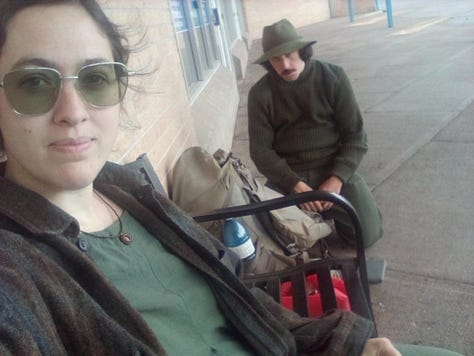
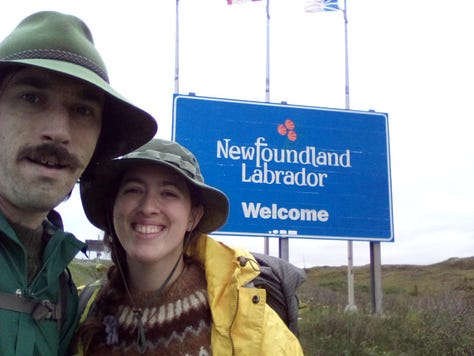
Our honeymoon has not been glamorous. We didn’t book some bikini-beach Hawaii tourism. The locals were not waiting for two honeymooners with handmade wares and gourmet traditional dishes. We weren’t looking for a good time, but for proof that the good times aren’t extinct. Do dreamers still move about in the day-to-day, committed to the work that every dreamer finds himself wrapped up in? The journey is rewarding if a little wearisome—such is the price you pay for run-ins with openhearted, conversational, welcoming, no judgement or expectations, come-as-you-are-and-join-me-in-what's-God's strangers.
Crossing into Canada was nearly too easy once they saw Andy’s bank statement (the wedding money helped!!). They didn’t care about our backpacks. We walked through, feeling as if we’d been handed a silver platter at a buffet. The future was ours for nibbling at. We got a train out of Cornwall to Truro, and while waiting in the empty station, I saw a pile of abandoned coins and a couple scraps of paper with scrawled notes; a grocery list and a bullet point analysis of a man’s life and character worth. I stuffed them in my book, wondering who this old man was that he’d write these things down—these things that made him who he was, and these things he needed at Wal-mart—and why he’d leave behind three dollars worth of change. I pulled out my wooden recorder. A stranger entered the building and sat by us to talk about string-band festivals, then left us, a nameless, smiling face.
The first thing I noticed about Canada’s train compared to USA’s is how much fun everyone seemed to be having. The young kid who scanned our tickets brought us a free cup of coffee because “we were going to throw it out anyway and you have a long trip ahead of you”. We passed through Montreal, changed trains, then boarded our long-haul ride. Andy went to the viewer car. I stayed behind to decompress in a book. Twenty minutes later my husband returns, “Come! Everyone wants to meet you!!”

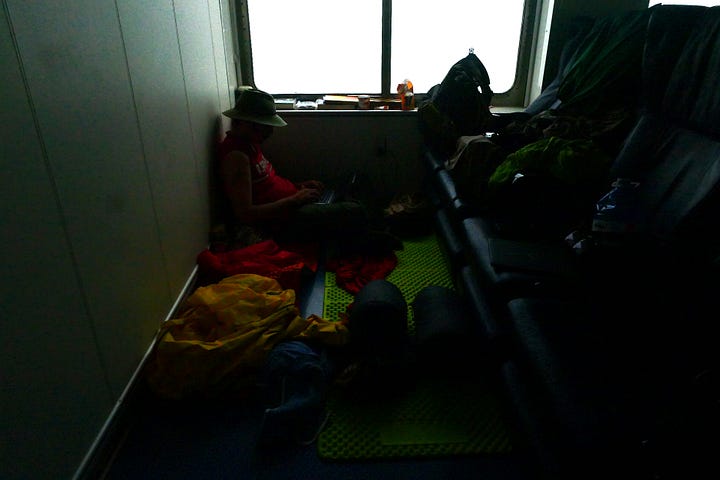
I dropped the book, Andy pulling me along through the train, having no idea who “they” could be. He was ecstatic though, so I figured it must be a cool crowd.
We entered the viewer car. One wouldn’t know that it was a room full of strangers. There weren’t enough seats for all the men present—and yet there seemed no lack. Even the women behind the counter was in on the party spirit.
“There she is! And she’s beautiful! You weren’t lying!”
We laughed until the hour grew late, and then we talked of serious matters—of politics and families and values. We didn’t even want to let a yawn escape for fear it would jinx the moment although we were dreadfully tired. We remained until it was impossible to keep our eyes open. And yet, when we parted, we parted feeling we’d been touched by perspectives of others.
The train ride wasn’t particularly comfortable. (sleeping is cramped). However, the staff remembered faces and names, and passengers were curious and willing, open books. Somehow the exhaustion feels a small price to pay when surrounded by happy people. There was a whole community on this train—the rooted and the transient, and together they blended well with no room for “cliques”.
We got off in Nova Scotia and hopped a bus to Newfoundland. A man gleeful with booze tried to hug Andy. Later he punched another man in the nose. Cops showed up, we stepped off into a chilled drizzle, the man was removed, then we were let on our way. Meanwhile, I tatted lace earrings—my ears aren’t and never will be pierced, but I felt inspired.
We stayed at a hotel a short walk from the ferry that night. Those are the times when you dwell on how “hard” travel is as you climb steep hills late in the evening with a heavy pack. We get grumpy. I practice the womanly gift of “complaining”, or of “crying”. And then we settle down and Andy suggests I lighten my load—or let him have more of it. And I claim, “No, it’s not too heavy for me” before requesting we visit the local thriftstore on the next day.
We took a seven hour ferry to Newfoundland. We’d planned to hitchhike with the ferry traffic, not realizing that they let those who walk on to the ferry off last. When we touched grass again we were alone and all the passengers were miles ahead of us. And so we stayed at a hotel—where I got into silent conflict with one of the employees because she didn’t like to see that I wasn’t wearing shoes, and I didn’t feel like talking about it, so just left the dining room. I later wrote them an email about it, but have received no response. I decided to wear shoes for the rest of our stay in Canada because I didn’t feel like ruffling any more feathers, and mostly wanted to observe the culture and not be hassled by any more old ladies.

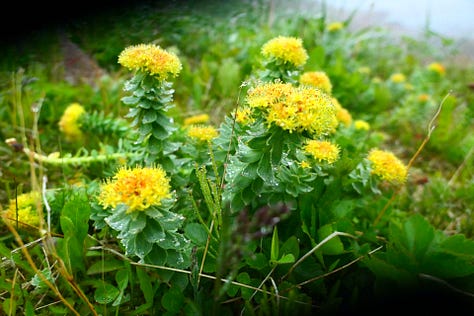
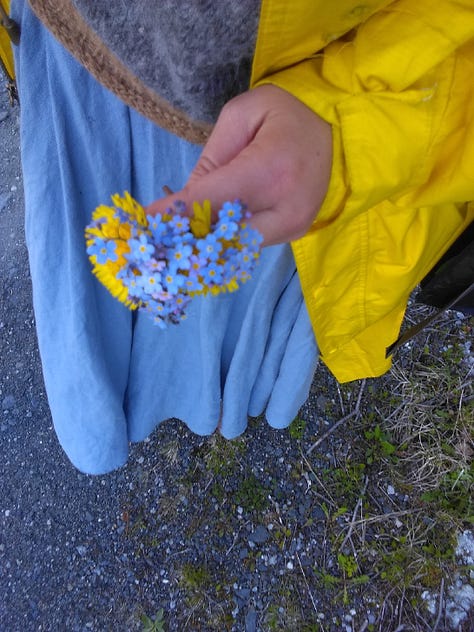

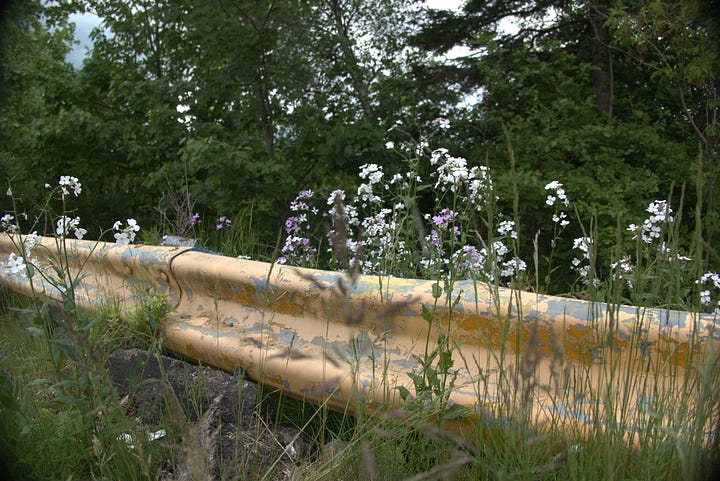
I’ve always dreamed of hitch-hiking never imagining I’d end up with a pro. Our first day was not easy though—oh, the people were nice, and very apologetic about heading the opposite way of us, not far enough, or of not having enough room for the two of us. That aspect of hitchhiking was encouraging. Even the cops passed us by, not bothering to glance our way. We weren’t treated as suspects or scourges of the earth. The lack of traffic was disheartening. We waited about eight hours that first day to get to our first destination—but when we did get that ride we were on high.
We didn’t have to wait as long for any of our other rides for the next nine days we were in Newfoundland. Sometimes we didn’t even have to stick up our thumb to be offered a ride—other times we would give up and then be offered a ride, or accommodations. We were never left stranded when it mattered. We had a lot of lovely conversations with all sorts of folks from immigrants to old-timers, to conservatives our age and vets to liberal, concerned women and gay couples. I would remember their names at the end of the day to write in my journal—Mike, Ashley, Brad, Gerard, Adrienne and Claudia, Peter, Sachin, Shane, Juan and Bas, Bonnie, Yves and Claudette, Mark and Matilda, Wendy and Kate and Brady, Dennis, Peter, Francais, and others who never gave me their names.
I would sit in the back and say little (sometimes I would be napping, usually I was eaves dropping). Andy had many questions—he’s ask why they remained in Canada and if they were happy with the political climate. Only one man claimed he believed the US Constitution was superiors to Canada’s; unfortunately we never got to ask him why he chose to stay in Canada despite that belief. He gave us a bottle of wine and bid us congratulations.
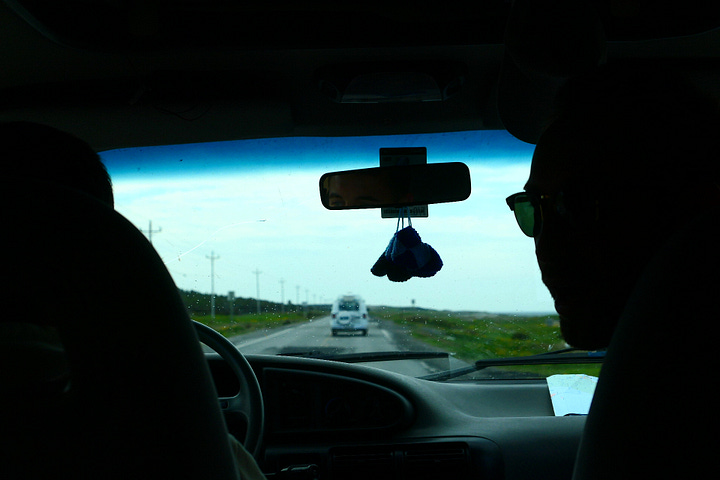

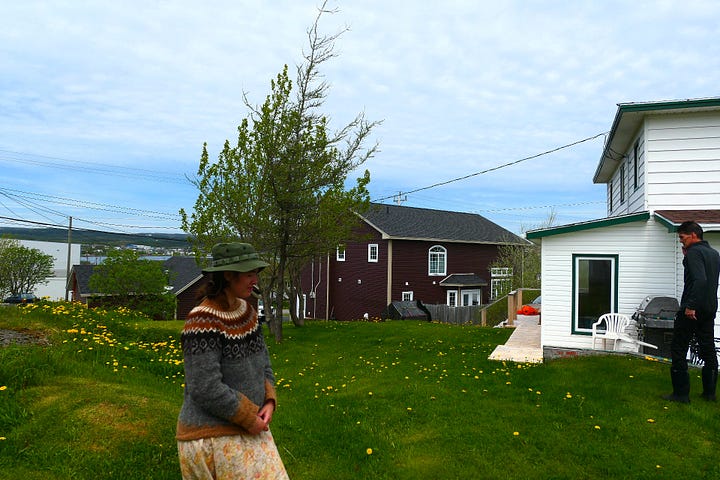

Midway the towns grew smaller—little business, a lot of displaced old-timers, and few children. We sacrificed good hitchhiking hours to attend a late morning Anglican service. We were the only young people present. It appeared to be a congregation of widows; I counted thirty women and five men. Every role was filled by an old woman.
Most who saw us were happy to see new, young blood. This was a place more rugged and magnificent than Montana with the Atlantic to our left and the mountains to our right. They say these sorts of places make the people tough. But unlike the mountain West where they sport bumper stickers that say “I hear North Dakota has room”, these people informed us, “you like it here? Our houses are cheap!” These people know the harsh realities of cold climates, shortage of food, and the necessity of quick-thinking to survive. And they know you can’t do it a lone without neighbors. They get that without community those travails would eat them up and wipe them away. There is no self-sufficiency without neighbors. Without cooperation and collaboration they would be consumed.
We made it to L’anse aux Meadows, a childhood dream of Andy’s, in a little over a week of rides. Here, too, we were met by a different sort of people—a people aware of what they had to offer, and so either intentionally generous or a little two-faced (accepting our money with a smile while wishing we weren’t disrupting their idea of what’s ought to be “proper”). You can tell when someone doesn’t like you even if the reason isn’t always clear, and I could tell these people didn’t like us—either because we looked haggard, or because I wore dresses, or because we didn’t fit the demographic of retired clients they usually served.
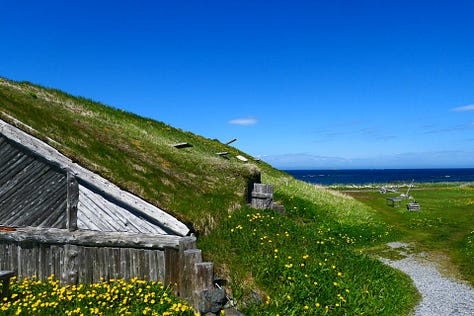
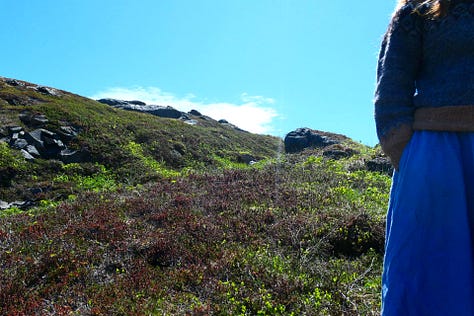

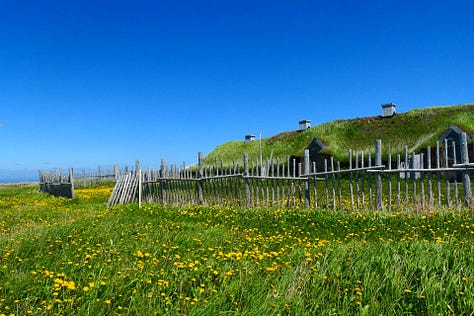
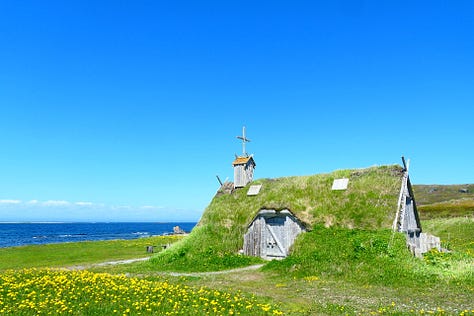
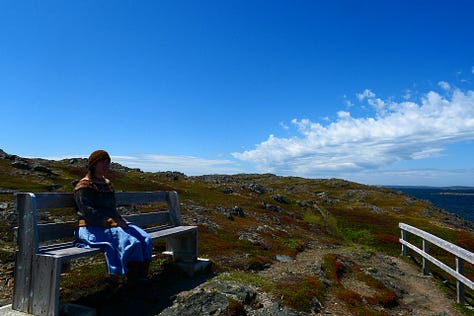
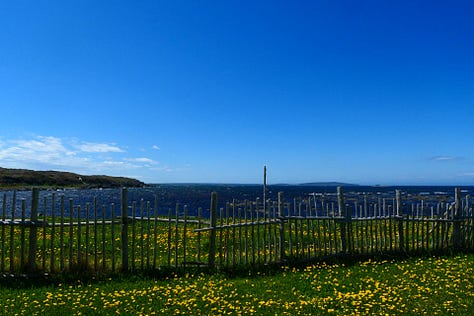
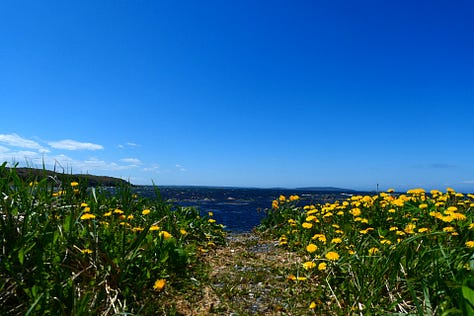
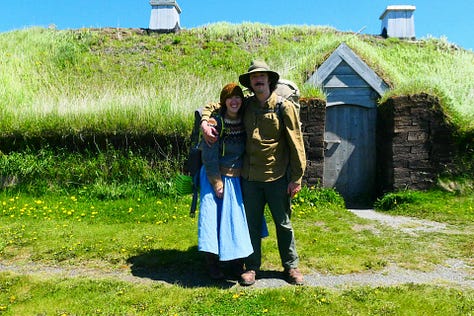
However, despite the offish behavior, we loved this place. The old-timers were sincere. Those working at the viking settlement loved what they did and would’ve talked our ears off if we wished. We could touch the exhibits, and there was little sign of national historical site—the boardwalk was unobtrusive, most things were left natural, unmowed, untouched by signs and “precautionary” designs. It felt something like how it must’ve been when the vikings had settled here. We walked through the buildings and talked of having a house like it, and we walked up the beach where we found shells, and where I found a clam with pearls inside.

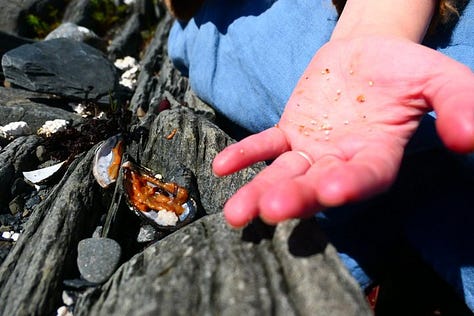

After that we hitchhiked to St. Anthony. We’d given up finding any other ride that night and were walking back into town looking for a place to pitch a tent. Andy lamented on how we hadn’t been invited to camp in anyone’s yard, as he’d heard tale of, and of how he was tired of stealth camping as if it’s a crime to sleep. A man pulling out of a ball park saw us, stopped and rolled his window down, “Where are you staying tonight?”
It was as if God had heard Andy. In minutes we’d gone from desiring to do something to pitching our tent in a stranger’s yard. He turned out to be such a fascinating person with a wide variety of experience from bank robbery to martial arts teacher. Everything he had to say either provoked deep thought or emotion—and he had so much hospitality to offer, making sure we had showers and food and gear.
We could’ve stayed there talking with him for years to come—we hitchhiked to a two hour ferry that would take us from Newfoundland to Labrador, and there a hotel gave us permission to camp behind it. This little town, too, charmed us. The gas stations were also the shoe stores with legos and Little Golden books for sale. We ran into the guy who sold the ferry tickets while having a picnic at the park, and learned crucial information for parking. Later we sat on a bench a couple miles of the road, then noticed a welcome sign behind it with a path into the woods. We followed it up to a little fire pit, and steps up to to a house. We went and asked permission to pitch our tent—and the parents of the man we’d met earlier greeted us. “Of course you may! We’d have put a Private Property sign instead of Welcome.”
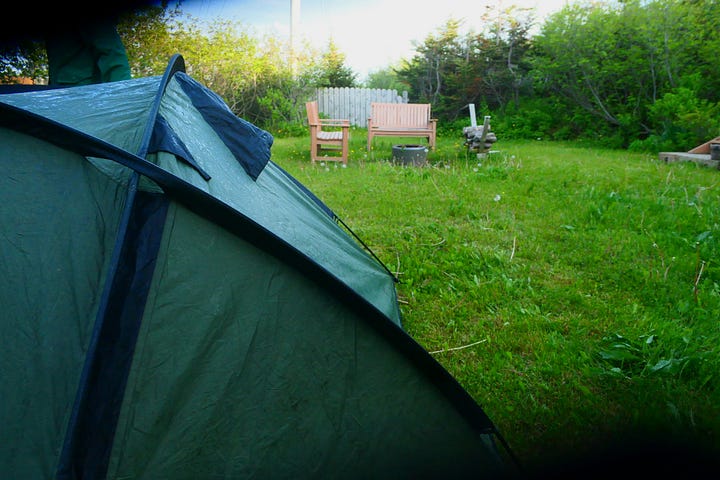
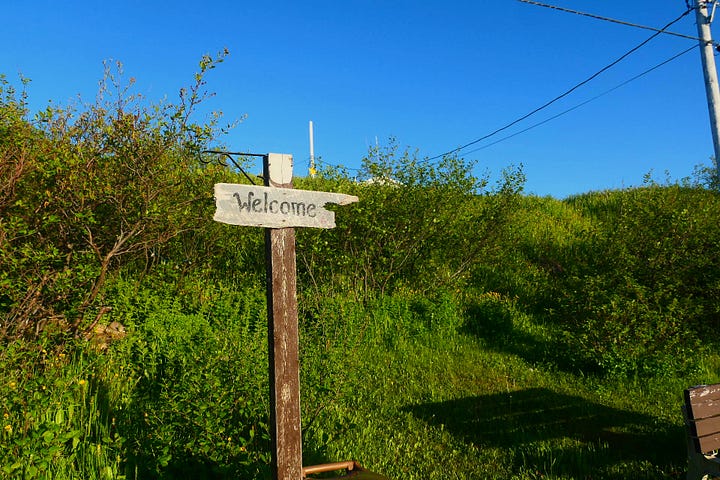
We have dreams of someday taking the Queen Mary II to Europe. We thought a four day ferry ride would prepare us to sea sickness. The waters were calm, though. Everything about our ride was comfortable and luxurious—we laid our sleeping gear out on the floor in front of our seats, and slept better than we had in awhile. The boat rocked just enough for it to be soothing.
Just like Via Rail, everyone on board the Bella loved their job and went beyond duty, remembering faces and names and stories. The tour guide didn’t seem to have a shtick; she shared what she knew, she welcomed questions, and she repeated herself often without a glint of frustration or boredom. The Captain, too, stayed after his presentation to mingle. The cafeteria cook and his assistant chatted freely, and when they ran out of food, they joked about “still being alive tomorrow” after they’d been “robbed”.
After one more bus ride, and then another day of hitchhiking we made to the U.S. border to Maine.
On June 6th—my paternal grandmother’s birthday—we left the States for the foreign country of Canada with nothing but what we carried on our back. We had no plans but to leave behind our disillusions and test the hospitality of strangers. We might be gone for months, we thought. We returned on June 26th—my maternal grandmother’s birthday. My first words upon reentry of my native land was, “I hate it here” because I’d just had my backpack rifled through and something unapologetically broken. There were no mentions “Welcome home!”, only “You’re free to go.”
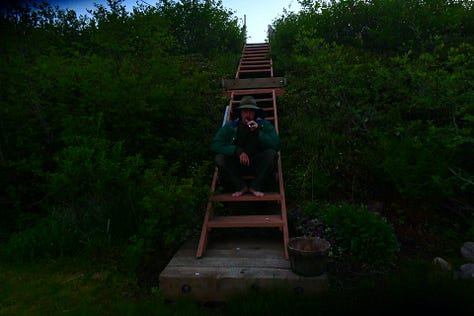
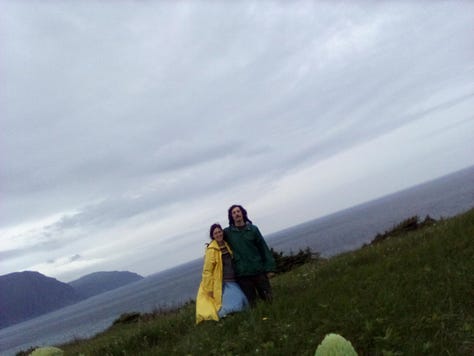
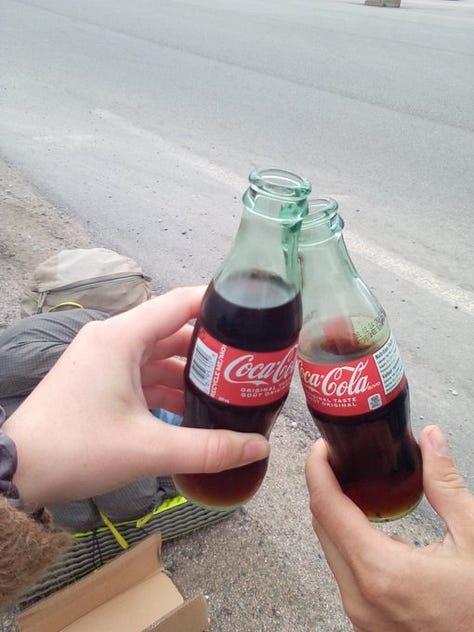
Everything is grittier, louder, and obnoxiously conceited. In some ways we do have it better—yet do we really know why?
We met a woman randomly yesterday outside the library. She was everything I feel is vulgar about America: clad in poor taste with every fold of her center-front separated by thin, tight leggings, preaching to us of how “the fall of man was the best choice humanity ever made” and the righteousness of technology. At the end, she said, “I hope my perspective has opened your eyes a little and cleared away some of your bias.” We listened, not bothering to argue (do not throw your pearls before swine when the swine has clearly made itself known). I felt immune to the manipulative tactics of the demonic in that moment after spending weeks witnessing real people living real life—also I’ve read those Frank Peretti novels that described women just like her.
She begged us to realize everyone has their own perspective—I was reminded of those men we visited with in the viewer car of the train, and agreed. We’d been touched by their perspective, in part because they were genuine and not forced upon us. Not all perspectives are valid. Some do lead to death. Not all collaboration and cooperation is good for the health of the community—a little cynicism is essential.
Only a little, though. It’s convenient to be aware of the failings of those you love so you understand how to better trust them and won’t be as easily provoked to cut them off at the first sign of “differences”. Enough cynicism for the sake of practicality—so you know who to tell to show up two hours early if you want them to arrive on time and who you can ask to bring an extra dish—enough cynicism to oil the intricate mechanisms of a high-trust community. But not too much, or you’ll end up drowned in a flood of bitterness and inflicted isolation.
Somebody asked if I had my own things going, or if I were my husband’s supporting actress. I paused, said both. Honestly, though, I’m mostly just the supporting actress right now and it’s so much fun. I worry about little. I stick up my thumb and smile when Andy tells me to. I sleep wherever he decides for the night be it at an overpriced cabin, in a rickety motel, or in a tent behind some stranger’s house. I wake up not knowing how the day will look two hours hence, only that by the end of it we’ll be in each other’s arms. I could be neurotic and demand “stability”, but where would the thrill be? We’d lose ourselves to the machine and its mundane cookie cutter requests. All for what?
There’s something sweet right now in letting my dreams simmer on the back burner (the burner is still on) and in watching my man’s dreams unfold, of yapping or whispering in his ears, and of thinking I have a part to play in egging him on in his vision.
This honeymoon has been but a foretaste of all that is yet to come.
I’m keeping my Substack free for now, but you’re welcome to “buy me a coffee”. Thank you!!


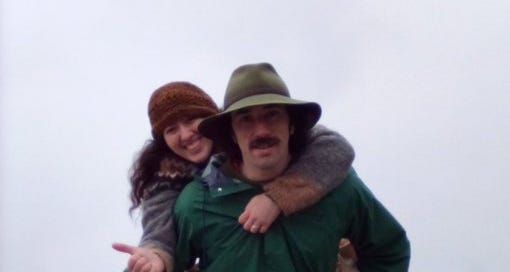




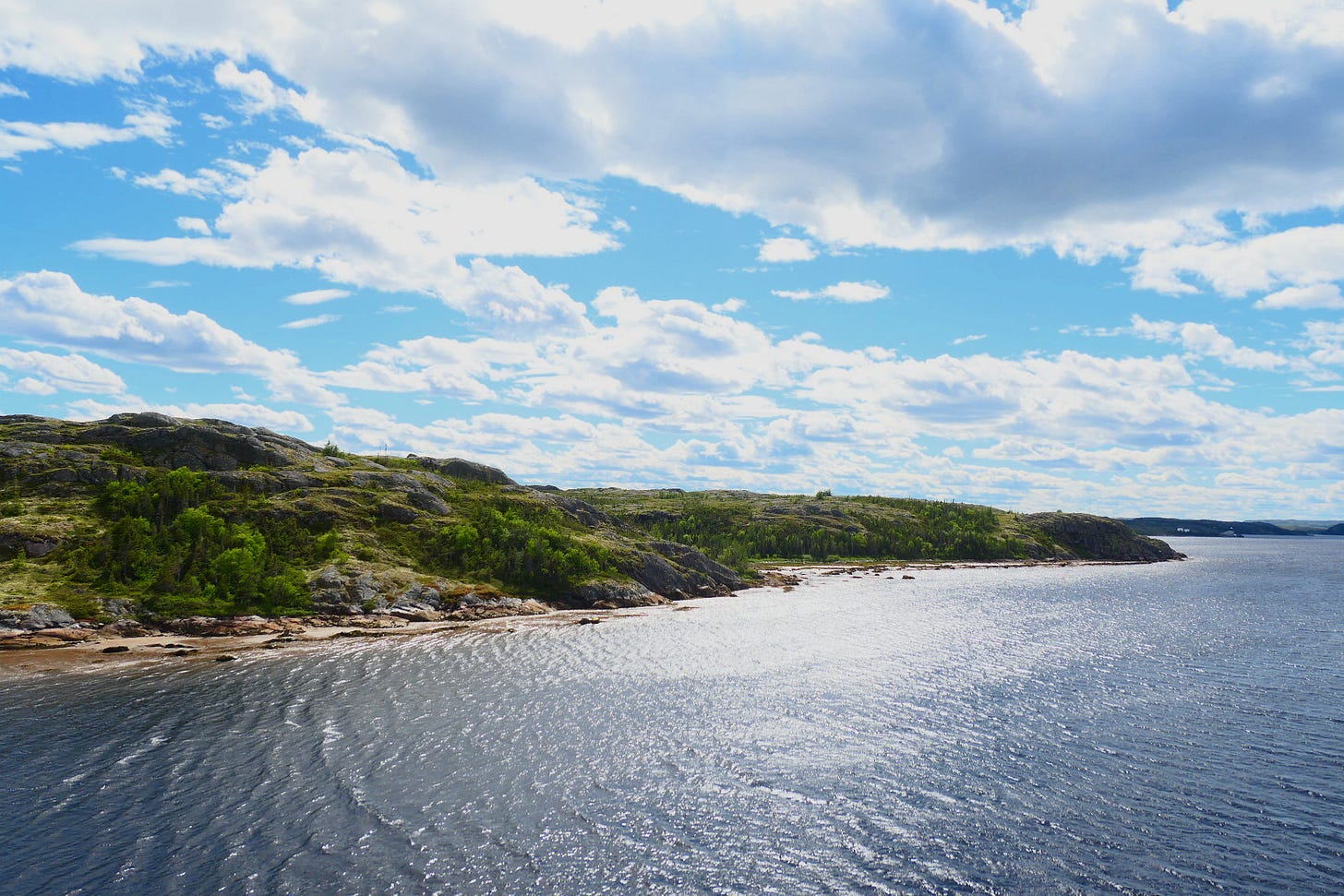
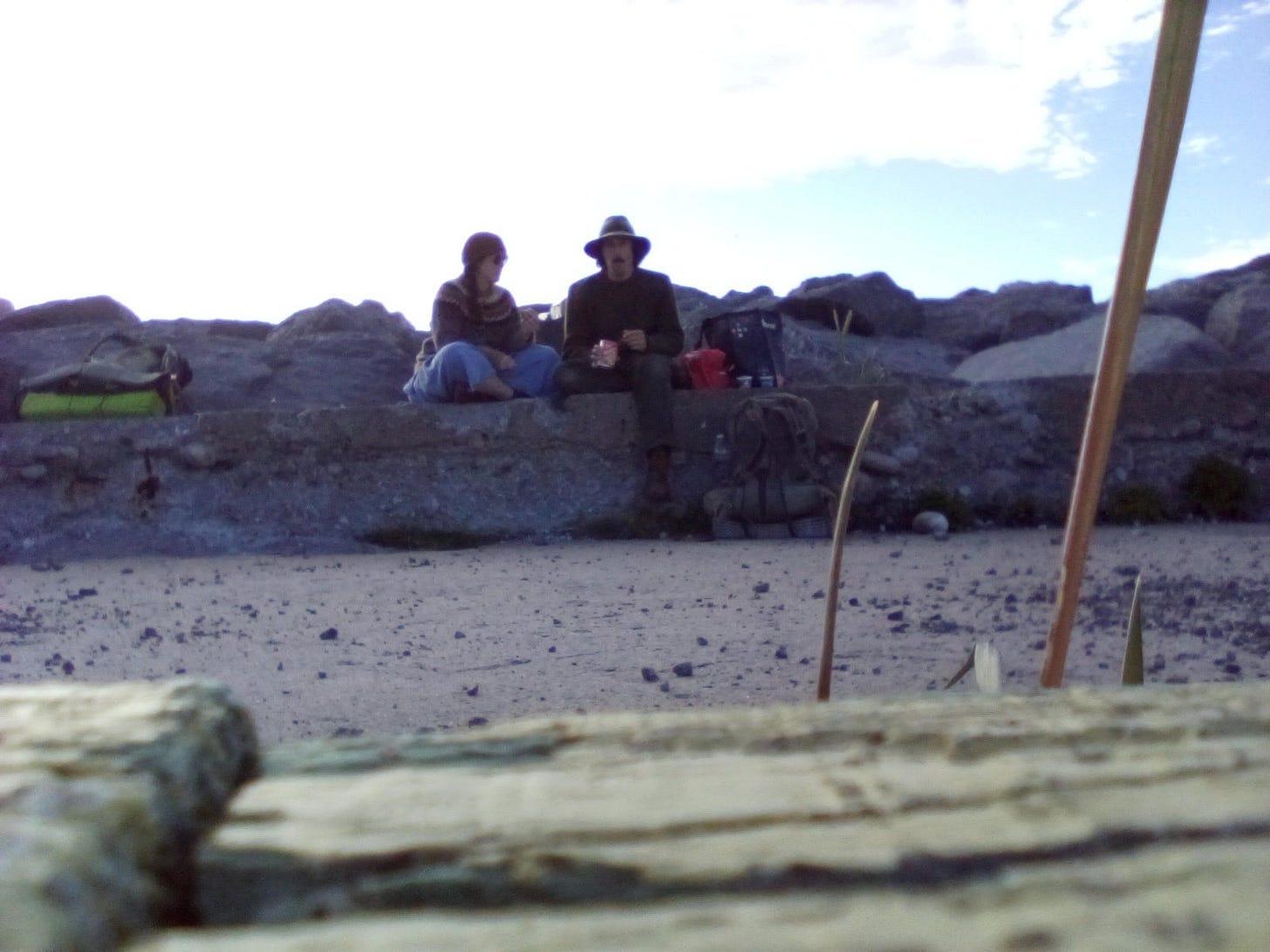
It is fun to see the pictures from Nova Scotia. It looks likenour honeymoon! We went to Lunenberg. We rented a tandem bicycle instead of a car. Lovely days.
Congratulations! What a life your family will have. Thank you for sharing.